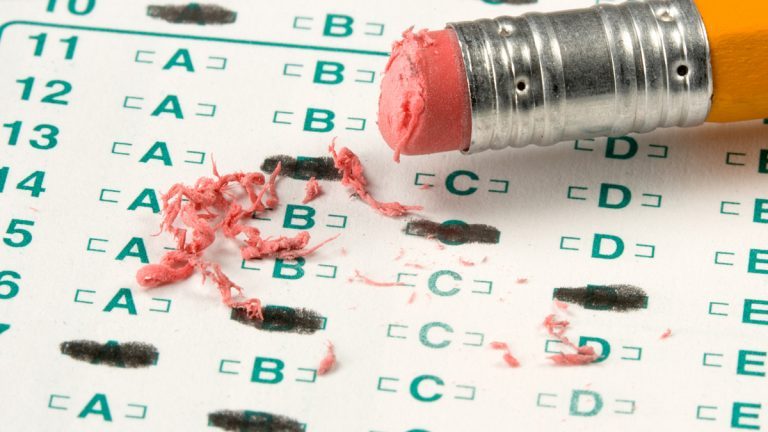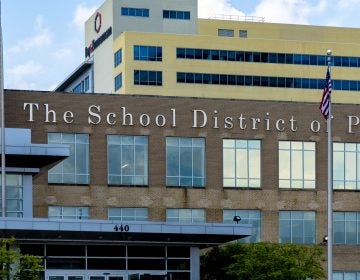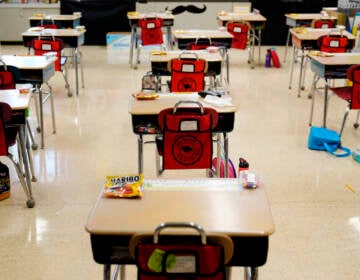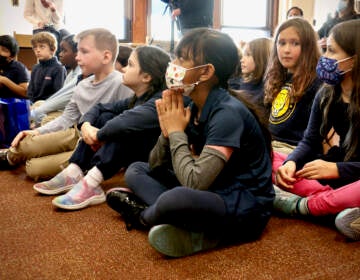Pa. cancels standardized testing because of coronavirus
There are clear indications that Pa. might cancel standardized tests this year for students. What kind of impact could that have?

Close-up of a standardized test. (Bigstock)
The extraordinary decision to close schools statewide due to the coronavirus outbreak has prompted Pennsylvania to make another extraordinary decision:
The state will not administer standardized tests this year.
That includes the PSSA tests given to students in grades 3 through 8, the Keystone Exams given to high school students, and the Pennsylvania Alternate System of Assessment.
Annual testing is mandated by federal law. Secretary of Education Pedro Rivera said Pennsylvania will apply for a waiver from the federal government.
“Our school communities are operating within unprecedented conditions,” said Rivera in a statement. “Schools are making extraordinary efforts to remain connected to students and families, to provide food service and to put appropriate systems in place to continue student learning. Assessments should not be the focus of school leaders right now.”
The decision comes amid national pressure to cancel high-stakes testing — an annual tradition in America’s public schools. Figures as divergent as the Chicago Teachers Union and the right-wing American Enterprise Institute have called for for a testing hiatus.
Andy Dinniman (D-Chester), a longtime opponent of state testing, had been pushing hard for Pennsylvania’s Department of Education to cancel this year’s round of tests, which were set to take place in late April. Under normal circumstances, many schools would have been preparing students for state tests in the coming weeks.
“For people to have to worry or think about the test — whether they be students or teachers — makes absolutely no sense at this moment in time,” Dinniman said.
The cancellation may come as welcome news to many — including some of the students who sit for exams.
But ditching these annual exams will also cause ripple effects across an education system that relies on testing data in myriad ways.
Now, state and local leaders will need to find workarounds for a lot of different items.
They include:
Identifying schools in need of intervention
Every year, Pennsylvania releases a list of struggling schools that have to implement improvement plans. The state, in part, uses student test scores to generate that list — and then doles out federal money earmarked for school improvement.
Philadelphia has a similar system in place for placing schools in what it calls the “acceleration network.” Schools in this network have to craft turnaround plans, some of which include hiring new teachers or administrators.
Student test scores play a crucial role in identifying which schools receive these kinds of interventions — and which earn praise. Philadelphia’s school-rating system — known as SPR — is used as an annual benchmark of school success. By melding test-score data with other factors like attendance and parent engagement, the district decides which school strategies to replicate and which schools need interventions.
In general, the tests give some key insights into how schools are serving students of different races and economic backgrounds — most often showing a clear correlation between poverty and poor academic performance.
Admissions for magnet schools
Philadelphia has a large group of magnet schools, many of which use standardized test scores to make admissions decisions. According to the district, 24 schools have admissions thresholds based on how well students perform on the statewide PSSAs.
High schools use seventh-grade PSSA scores to make their determinations, while many middle schools rely on third- or fourth-grade scores when winnowing candidates.
For years, seventh-graders like Alfred Safier, a student at Penn Alexander School in West Philadelphia, have been told that this is a crucial year for mapping their educational future. Now that the fate of state testing is up in the air, Safier wonders what will happen.
“If they don’t have it at all it’s going to make the high school applications probably more complicated,” he said. “But they’ll probably figure it out.”
When Keystone Crossroads reached out to principals of Philadelphia’s magnet schools, most said they weren’t worried yet about next year’s admissions process. There are bigger challenges to confront before then.
“We need to make decisions right now that are in the best interests of everyone’s health and well-being,” said Chris Lehman, principal of Science Leadership Academy. “If that means schools have to rely on all the other data next year, we can figure that out.”
The School District of Philadelphia said it’s awaiting further clarification from the state as it formulates backup plans.
“The School District of Philadelphia is working with the Pennsylvania Department of Education and has not received further guidance at this time regarding assessments,” said spokesperson Megan Lello in a statement. “The District will work on a contingency plan in the next two weeks and will continue to monitor the situation.”
Charter-school evaluation
Charter schools seeking renewed contracts must make a pitch to their local school boards.
Those renewals allow charters to remain open — typically for another five years. Nonrenewal can lead to a school closing its doors forever.
School boards have some discretion in how they make these renewal decisions, but testing data often figures prominently. If schools up for renewal in 2020-21 don’t have recent performance data, local boards will have to either delay the renewal process or find workarounds that satisfy all parties involved.
Teacher evaluation
Pennsylvania has a statewide teacher evaluation system and student test scores are a major part of the calculation. Excising test data from the system would cause more trouble for a system that many already want to change.
The practical implications of this will vary. Districts can use teacher-evaluation data when making layoff decisions.
Distributing private-school scholarships to students
Pennsylvania makes $50 million in tax credits available each year for a program that supports private-school scholarships for students who live in neighborhoods with low-performing schools.
To qualify, students must be assigned to attend a public school that ranks as one of Pennsylvania’s worst. The state creates this list of “underperforming” schools by looking at student test scores.
Eliminating standardized exams would require some sort of temporary solution to determine who qualifies for this aid.
WHYY is your source for fact-based, in-depth journalism and information. As a nonprofit organization, we rely on financial support from readers like you. Please give today.




![CoronavirusPandemic_1024x512[1]](https://whyy.org/wp-content/uploads/2020/03/CoronavirusPandemic_1024x5121-300x150.jpg)


